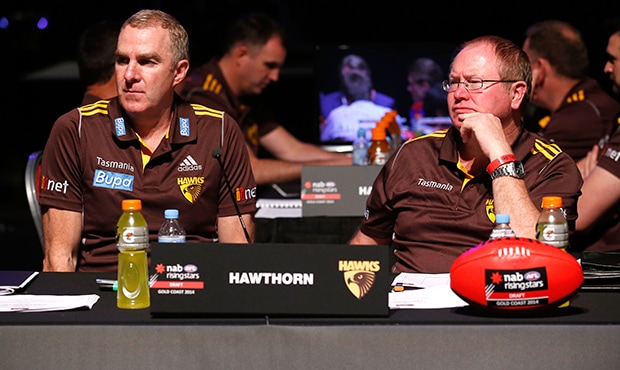THERE was surprise in some quarters last week when Fremantle coach Ross Lyon said that he had no say on the Dockers' drafting decisions.
"Let the cobblers do the cobbling. I certainly don't do the recruiting and I don't do the national draft," Lyon said after the club's 89-point loss to Port Adelaide.
"And I would say that goes for all clubs. That's why they call them national recruiting managers and list management. That's what they do. I'm paid to coach."
So, does the same principle go for all clubs?
It is hard to think that Lyon wouldn't have any involvement in Fremantle's long-term list strategy, particularly given his recent (enough) contract extension through to the end of 2020. Also, as a coach with a love for detail and an eye over his whole club, he would likely come armed with questions to recruiting meetings. Most do.
However, AFL.com.au canvassed clubs about the level of involvement their senior coach had in the drafting process and found, on the whole, it was relatively minor.
Some senior coaches speak to their recruiting or list manager twice a week for updates on the talent pool; others are only given a five-minute briefing on the state of play at monthly list management meetings.
Most agreed that, at this stage of the season, the senior coach would know little about the players available at this year's NAB AFL Draft, and that their involvement only really ramped up once the season ended.
However, the inclusion of trading future picks has meant some clubs prepare documents for their coaches informing them of the upcoming draft class in case the club is keen to trade out the following year's picks. They need to be aware of what they might be giving up.
Long-time scouts believe recruiting departments have become more transparent with coaches about their plans over the years, but interference is minimal from senior coaches. Asked the weight placed on the coaches' view in a drafting decision, most recruiters said around five per cent.
Former Hawthorn recruiter Gary Buckenara, who helped shape the Hawks' premiership era before departing the club in 2015, said the senior coach had little say in national draft decisions.
Hawks list manager Graham Wright (left) with former recruiter Gary Buckenara. Picture: AFL Photos
"For the recruiting at the draft, the role of a coach in the decision making is a bit overplayed. And to be honest, it's a bit dangerous when coaches want to run everything," Buckenara said.
"The recruiters are out there, they're paid to do a job and they've done their work, watched most kids, and done the interviews. A lot of the coaches get highlights tapes and fall in love, which is a very dangerous thing, because the highlight tapes are only the good stuff.
"We would present our plans and very rarely would 'Clarko' (coach Alastair Clarkson) interfere when it came to the draft. He was very active in the trading of players. That's where coaches have an understanding of the players from other clubs and they want someone who can help them now in the gaps of your list model."
But a coach's expertise can be used to guide a recruiting team's decision. Some clubs will call on their assistants or senior coach to watch vision of a player if there is a flaw in their game: is the player's kicking good enough? Can it be improved? Does he understand the mechanical aspects of a midfield stoppage and where to stand?
Much like a club medico will assess a prospect's injury history and shape the recruiters' views on whether someone is fit enough to make it, a coach's view on a player's specific skill may form part of the puzzle.
Before picking a ruckman, some clubs will include the senior coach more in the decision than they might for a midfielder, treating that selection a little differently and more as a list management call.
For most clubs, the senior coach only attends interviews at October's NAB AFL Draft Combine as a chance to meet the players likely to be around their selections.
Some list management teams will only provide their ordered list of prospects to a coach a couple of weeks before the draft in November; in part because it is always in flux, but also because the coach allows them to do their role.
There are circumstances where coaches have become heavily involved in a draft choice. It is not unusual to hear of a player being picked that the coach was strongly in favour of, and hence getting a better run at the selection table.
Sometimes the opposite has applied as well, with a recruiting team picking a player when a coach favoured another prospect. In some of those anecdotal examples, the player has then struggled for as many senior opportunities.
But (largely) this is considered the exception to the rule. Said Buckenara: "Clarko would have his opinion but in the end it was what we as a recruiting team decided."


